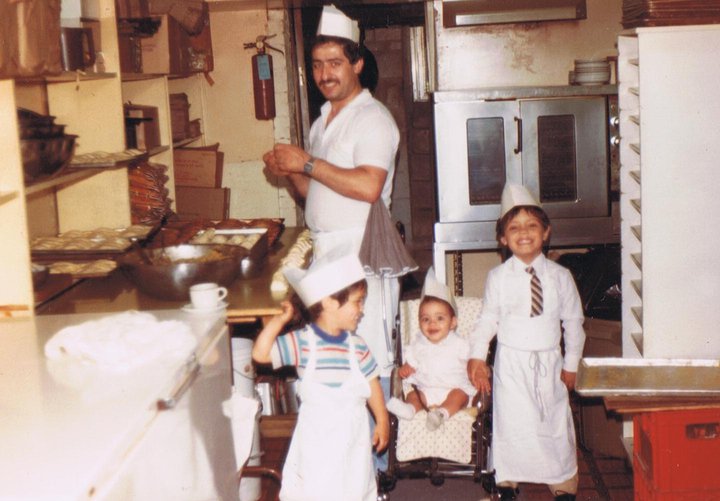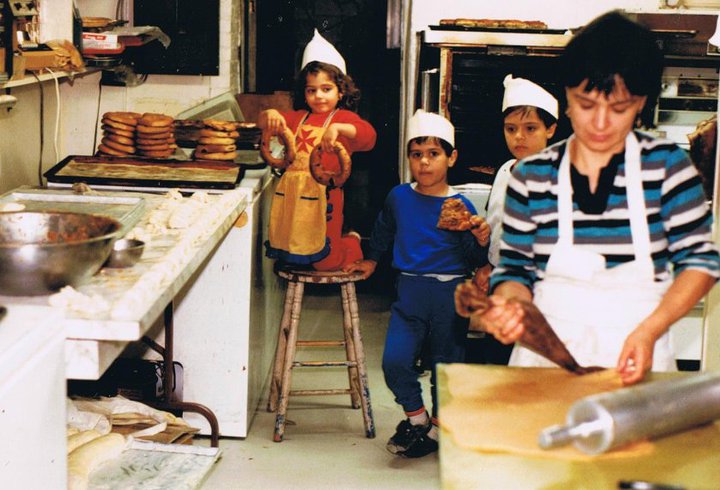Tucked away at the west end of The Junction, in Toronto, the bakery shop is extremely popular. Newspaper cuttings, photos and maps of Malta are lined on the wall. On a television screen, a live stream of the Grand Harbour is featured. People make their way in to buy pastizzi (cheesecakes), qaghaq tal-ghasel (honey rings) or to dip some krustini in their tea.
In the area known as Little Malta, local traditions have been kept alive – be it religious processions or the traditional figolla during Easter.
Charlie and Antoinette have almost become like trusted family members for the regular customers.
Only a few weeks ago, the couple closed the shop for a day, because one of their daughters was getting married. The customers panicked, thinking it had shut down for good. The hub offers a source of comfort, especially for the elder generation.
“We know what they’re going to order as soon as they walk in. They trust us with their stories. We’ve laughed at their jokes, but we’ve also cried with them. News of someone who’s ill or has passed away travels fast, and a cloud of sadness can be felt amongst us,” Antoinette says.

The beginning
Back in the 1920, hordes of Maltese immigrants made their way to Canada. In a basement situated at Dundas Street, in a place known as the Junction, Toronto, they started to meet up, sharing experiences from their home island, and gossiping about mutual acquaintances. It was there the Maltese community in Canada began. It was there the Maltese soccer club and the Maltese band club got together. In fact, over the years, the area became known as Little Malta.
Close by, two Maltese siblings opened up a coffee and pastizzi shop. In 1950s, a church run by Frangiskani was built a few doors up.
Charlie Buttigieg moved to Canada in 1973. Five years later, he moved back to his hometown in Gozo, where he met his wife Antoinette. Shortly after they moved back to Canada, Charlie started helping out part time at the bakery shop.
During the late 70s, a recession hit Canada and many workers were laid off, including Charlie himself. At the same time, the siblings owning the shop were intending to sell the place. At that point, the married couple considered two options, moving back to Gozo, or buy the bakeshop. Initially, the couple’s plan was to stay in Canada for five years, however thirty years on, they haven’t looked back. And the bakeshop plays a determining factor.
.jpg)
The shop offers a wide variety of Maltese tradition food, however pastizzi remain the sole favourite, and it is not only popular among the locals. Foreigners have come to love them, and go to the area specifically to try them out.
Besides the fresh product, the company sells a large number of frozen pastizzi. Customers come from all over Canada bearing large ice coolers to transport the food back to where they’ve come from. Some travel for hours to get to the shop. Some purchase up to 30 dozens of the product. Before 2001, the product was also exported to the United States, however following the 9/11 attacks, the country placed a number of restrictions.
Most foreigners used to refer to pastizzi as cheesecakes. But Charlie and Antoinette wanted to completely abolish the term in their shop. “People would come in asking for them, and we’d tell them we’d run out. They’re let down for a second, before we proceed to ask if they mean pastizzi, in which case, we have plenty,” Charlie says with a smile. Gradually, the Maltese term started being used.
In Canada, people still purchase the local product to celebrate lifetime events – be it christening, weddings, or funeral. It is always the first food item to run out.

A taste of home
Besides offering the traditional foods, Charlie makes an effort to create a home feeling for his Maltese customers, while creating the chance to boast about his home country with the foreigners.
Streaming the live online webcam on screen, customers can see the view of Barrakka, or the Grand Harbour. Last April, along with thousands in Malta and Gozo, customers followed the inauguration of Marie Louise Coleiro Preca as president. During summer, they follow television programmes featuring the local festas.
“Some of the elderly get tears in their eyes, simply at a glimpse of their hometown,” Antoinette says.
In the surrounding area, the Maltese community still engage themselves in local traditional rituals –the procession on the feasts of our Lady of Sorrows, Santa Marija and the Vittorja. In June, they celebrate Mnarja at a park close by.
A number of local prominent figures have visited The Malta Bake Shop. Guido DeMarco, Censu Tabone, Eddie Fenech Adami, Alfred Sant, Rizzo Naudi and Archbishop Paul Cremona have all been there. Musicians Benny and Tonia even wrote a song called The Malta Bake Shop in Toronto.
Looking ahead
When the couple took over the shop, they were still relatively young and bringing up three young children. From a young age, the children helped around the shop in the own little ways. Today the eldest, Josef is a neurologist leading his own clinic; Antoine is a music director, Holly a cake decorator and Ivy a Mezzo Soprano. But despite having their own profession, they are still very fond of their family’s bake shop. They’ve also considering taking over the shop once their parents retire.
“We’d hate having to sell the shop once we retire. It is part of our family today. At the same time, we’re so proud of what our children have managed to achieve, and we wouldn’t want them to give it up for the business.”
Asking them what it’s like working with your spouse, they laugh. “We do have our little arguments, just like every other couple, and we do disagree on certain procedures. But today we both have our roles at the shop, and we try not to get into each other’s way – as much as possible.”
Considering the couple’s love for their home country, I ask them whether they ever considered returning back home. “We have two homes. Malta will always remain our country, but Canada today means family to us – all our children were born and brought up here. Back in 1970s, we said we’d try living abroad for 5 years then head back. 30 years have passed, and we haven’t looked back.”
Besides Charlie and Antoinette, four employees work at the shop during weekdays. Over the weekends that number verges onto six or seven employees. Employees of different nationalities work at the shop – a Brazilian is in charge of the pastry. Another two have Maltese origins – one is half polish, the other half Syrian. Most have managed to learn a few basic Maltese words – at least enough to manage an order request in Maltese.